 W
WGenerał Tadeusz Komorowski, better known by the name Bór-Komorowski was a Polish military leader. He was appointed commander in chief a day before the capitulation of the Warsaw Uprising and following World War II, 32nd Prime Minister of Poland, 3rd Polish government-in-exile in London.
 W
WPaweł Cyms was a soldier of the Imperial German Army and captain of infantry in the Second Polish Republic. He fought in World War I, Greater Poland Uprising (1918–19), Silesian Uprisings, Invasion of Poland, and in the Home Army during World War II.
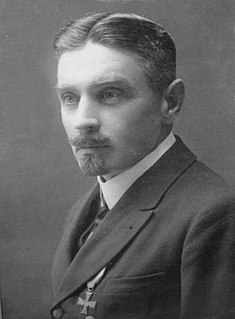 W
WRear Admiral Xawery Stanisław Czernicki (1882–1940) was a Polish engineer, military commander and one of the highest-ranking officers of the Polish Navy. Considered one of the founders of Polish Navy's logistical services, he was murdered by the Soviet NKVD during the Katyn massacre.
 W
WLudwik de Laveaux was a brigadier general of the Polish Army in World War I, World War II and Polish–Soviet War.
 W
WWitold Józef Dzierżykraj-Morawski (1895–1944) was a Polish military commander, diplomat and a Colonel of the Polish Army.
 W
WAdam Józef Aleksander Epler was a Colonel of Artillery of the Polish Army, posthumously promoted to Generał brygady. Epler had a wife Zofia and son Zbigniew.
 W
WMieczysław Jan Gębarowicz (1893–1984) was a Polish art historian, soldier, dissident, museum director and custodian of cultural heritage.
 W
WPola Gojawiczyńska, real name Apolonia Gojawiczyńska, née Koźniewska was a Polish writer.
 W
WMichał Grażyński was a Polish military leader, social and political activist, doctor of philosophy and law, voivode of the Silesian Voivodeship, Scouting activist and president of Związek Harcerstwa Polskiego.
 W
WEdmund Wacław Heldut - Tarnasiewicz alias " Heldut ". He was the senior colonel and commander of the Polish Army cavalry, a senior military officer of the Polish Armed Forces in the West, who received Poland’s highest military award, the Virtuti Militari, one of the oldest military decorations in the world still in use. He was heavily involved in World War I, the Polish–Soviet War, and World War II. Heldut was promoted to General, but the promotion was never confirmed due to the outbreak of World War II.
 W
WWładysław Jędrzejewski was a General of the Polish Army, who was probably murdered by the NKVD in Lwów, in March 1940. He fought in several conflicts, including World War I and the Invasion of Poland.
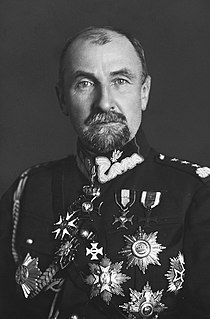 W
WCount Tadeusz Jordan-Rozwadowski was a Polish military commander, diplomat, and politician, a general of the Austro-Hungarian Army and then the Polish Army.
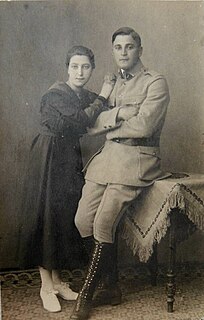 W
WLudwig Kasner was a German policeman of Polish ethnicity who worked with the Berlin Police. He was the paternal grandfather of German Chancellor Angela Merkel, whose birth name Kasner had been Germanized from Kaźmierczak by Ludwig Kasner in 1930.
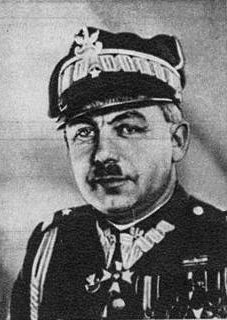 W
WGen.bryg. Edmund Stanisław Knoll-Kownacki was a Polish military officer and a high-ranking commander of the Polish Army.
 W
WLieutenant Bolesław Kontrym, also known by codenames Żmudzin, Biały, Bielski and Cichocki, was a Polish Army officer, a Home Army soldier, participant in the Warsaw Uprising and organizer of underground secret-police force Cichociemni. After the war, he was executed for anti-Communist activities by the Polish security apparatus probably on 2 or 20 January 1953.
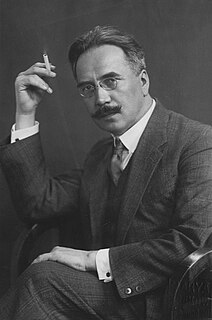 W
WStanisław Kot was a Polish historian and politician. A native of Austria-Hungary, he was attracted to the cause of Polish independence early in life. As a professor at Jagiellonian University (1920–1933), he held a chair in the History of Culture. His principal expertise was in the politics, ideologies, education, and literature of the 16th- and 17th-century Polish–Lithuanian Commonwealth. He is particularly known for his contributions to the study of the Reformation in Poland.
 W
WAdam Łukasz Królikiewicz was a Polish horse rider, major of Polish Army, who competed in the 1924 Summer Olympics. He was born in Lviv. He died in Konstancin-Jeziorna.
 W
WJózef Rudolf Kustroń was a Brigadier General of the Polish Army in the Second Polish Republic, commandant of the 21st Mountain Infantry Division.
 W
WTadeusz Kutrzeba was a general of the army during the Second Polish Republic. He served as a major general in the Polish Army in overall command of Army Poznań during the 1939 German Invasion of Poland.
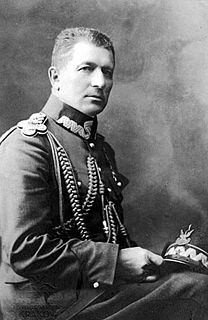 W
WFranciszek Ksawery Latinik was a Polish military officer, Colonel of Austro-Hungarian Army and Major General of the Polish Army.
 W
WJan Mazurkiewicz, pseudonym: "Zagłoba", "Socha", "Sęp", "Radosław" was a Polish military leader and politician, colonel of Home Army and brigadier general of the Polish People's Army. Founder of the Secret Military Organization, commander of Kedyw and the Radosław Group during Warsaw Uprising. After the war, he was a political prisoner of the Stalinist period. From 1964 he was vice-president of Society of Fighters for Freedom and Democracy.
 W
WBernard Stanisław Mond (Spanier) was a Jewish general of the Polish Army in the interwar period. He fought in the First World War, Polish–Ukrainian War, Polish–Soviet War and Second World War.
 W
WAlfons Jan Nagórski (1888–1976), also known as Ivan Iosifovich Nagurski, was a Polish engineer and pioneer of aviation, the first person to fly an airplane in the Arctic and the first aviator to perform a loop with a flying boat.
 W
WAdam Obrubański was a Polish football player and official, also a graduate of Kraków’s renowned Jagiellonian University.
 W
WKarol Piegza was a Polish teacher, writer, folklorist, photographer, and painter from Zaolzie region of Cieszyn Silesia.
 W
WJózef Klemens Piłsudski was a Polish statesman who served as the Chief of State (1918–1922) and First Marshal of Poland. He was considered the de facto leader (1926–35) of the Second Polish Republic as the Minister of Military Affairs. After World War I, he held great power in Polish politics and was a distinguished figure on the international scene. He is viewed as a father of the Second Polish Republic re-established in 1918, 123 years after the final Partition of Poland by Austria, Prussia and Russia in 1795.
 W
WLeon Jan Piniński was a Polish scholar, diplomat, art historian and politician. A professor of Roman law and one-time rector of the Lwów University (1928–1929), he devoted much of his life to a political career in his home city of Lwów, first under Austria-Hungary then in newly independent Poland.
 W
WTadeusz Ludwik Piskor (1889–1951) was a Polish Army general.
 W
WJózef Jan Klemens Pomiankowski was a Lieutenant Field Marshal of the Austro-Hungarian Army and later General of the Polish Armed Forces. He was the military representative of the Austro-Hungarian military mission in the Ottoman Empire in the World War I, during which he was in charge of shaping Austrian policy on the Orient, often in competition with the allied German Empire.
 W
WAdam Feliks Próchnik was a Polish socialist activist, politician and historian.
 W
WWładysław Raczkiewicz was a Polish politician, lawyer, diplomat and the first president of the Polish Government in Exile from 1939 until his death in 1947. Until 1945, he was the internationally recognized Polish head of state, and the Polish Government in Exile was recognized as the continuation of the Polish government of 1939.
 W
WKazimierz Raszewski was a lieutenant general of the Polish Army.
 W
WAleksander Romanowicz was a general of cavalry in both Russian Imperial Army and Polish Army. Born on 1 April 1871, on his family estate Olekszyszki, in 1890 he graduated from the Russian Army Cadet Corps in Polotsk, then entered the Officer’s School of Cavalry, becoming in 1892 a professional officer of the Russian Army. He was of Lithuanian Tatar origin.
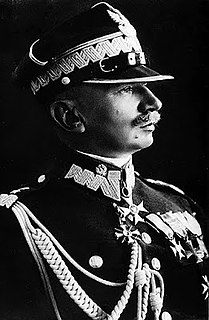 W
WJuliusz Karol Wilhelm Józef Rómmel was a Polish military commander, a general of the Polish Army.
 W
WStefan Paweł Rowecki was a Polish general, journalist and the leader of the Armia Krajowa. He was murdered by the Gestapo in prison on the personal order of Heinrich Himmler.
 W
WWładysław Hipolit Segda was a Polish fencer and military officer. He won a bronze medal in the team sabre event at the 1928 and 1932 Summer Olympics.
 W
WLeonard Wilhelm Skierski was a Polish military officer and a general of the Imperial Russian Army and then the Polish Army. A veteran of World War I and the Polish-Bolshevik War, he was one of fourteen Polish generals and one of the oldest military commanders to be murdered by the NKVD in the Katyn massacre of 1940.
 W
WKarol Śliwka was a Polish communist politician from Zaolzie region in the First Czechoslovak Republic. Śliwka was one of the most prominent political leaders of the Polish minority in Zaolzie and a member of National Assembly of the Czechoslovak Republic from 1925 to 1938.
 W
WMamert Stankiewicz was a Polish naval officer of the merchant marine, the commander of Lwów, Polonia and finally captain of the Polish ocean liner Piłsudski. On 26 November 1939 during World War II, while the captain of Pilsudski incorporated into the UK Royal Navy and converted into the ship transporting British and Polish soldiers was torpedoed by German U-boat, he, after inspecting the entire sinking ship that there were no sailors and soldiers left behind, and after rescuing sailors and soldiers from the ice-cold Northern Atlantic, he died of exhaustion. Stankiewicz's life was immortalized by Karol Olgierd Borchardt, whose series of books on Stankiewicz became a best-seller among Polish maritime books.
 W
WStefan Bronisław Starzyński was a Polish statesman, economist, military officer and Mayor of Warsaw before and during the Siege of 1939.
 W
WStefan Stanisław Stec was a Polish aviator and military pilot, one of the pioneers of Polish aviation. He is also credited as the originator of the Polish Air Force checkerboard.
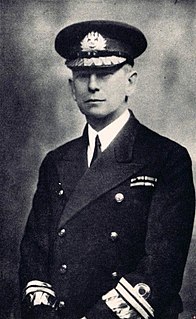 W
WJerzy Włodzimierz Świrski was a Polish vice admiral and officer in the Russian Imperial Navy and later the Polish Navy. As Chief of the Polish Naval Command (1925-1947), he was a member of an elite group of high ranking Polish naval officers from foreign navies who became founder members of the re-established naval forces of the newly independent Poland after World War I. During World War II, Polish naval forces under his command, were embedded with the Royal Navy and contributed significantly to the success of Britain's maritime war effort. He notably fell out with Poland's war time Prime Minister-in-exile, General Sikorski, but was backed by the British and survived in post. He was appointed an Honorary Knight Commander of the Order of the Bath.
 W
WSylvester Lvovich Stankievich was an Imperial Russian corps commander. He fought in the war against the Empire of Japan. After the October Revolution, he fought against the Bolsheviks in the subsequent civil war.
 W
WArthur Szyk was a Polish-Jewish artist who worked primarily as a book illustrator and political artist throughout his career. Arthur Szyk was born into a prosperous middle-class Jewish family in Łódź, in the part of Poland which was under Russian rule in the 19th century. An acculturated Polish Jew, Szyk always proudly regarded himself both as a Pole and a Jew. From 1921, he lived and created his works mainly in France and Poland, and in 1937 he moved to the United Kingdom. In 1940, he settled permanently in the United States, where he was granted American citizenship in 1948.
 W
WStefan Eugeniusz Tyszkiewicz, in Polish, Stefan Eugeniusz Maria Tyszkiewicz-Łohojski z Landwarowa, Leliwa coat of arms, was a member of the Polish nobility, landowner, engineer, inventor and an early pioneer of the Polish automotive industry. He was a decorated veteran of both World Wars and the Polish-Bolshevik War and social activist. After 1945, he became an exile, turned to publishing and politics as a member of the Polish National Council in London. He was an internationally feted inventor to the end of his life.
 W
WWładysław Wejtko was an Imperial Russian Army general of Polish descent. He fought on the side of the Second Polish Republic as a major-general in Józef Piłsudski's forces during the Polish-Soviet War of 1919–1921.
 W
WBronisława Wieniawa-Długoszowska was of Russian Jewish origin. Her father Salomon (Simeon) Kliatchkin (1858–1916) was the owner of the first credit bureau in the Russian Empire. Her mother was Helena Kliatchkin. She had nine siblings; one died in childhood, three in Joseph Stalin's purges, one survived in Russia and four survived in exile in France. The family's suffering under Stalin are recorded in a film shown on Russian television in 2008, История семьи как эпоха.
 W
WKarol Wojtyła was a soldier, non-commissioned officer of Austro-Hungarian Army and Captain of Polish Armed Forces' administration and father of Karol Józef Wojtyła, who later became Pope John Paul II. He died from what is believed to be a heart attack in 1941 while his son was away, and this event is considered to have influenced his son's decision to join the seminary.
 W
WAntoni Wysocki was a member of the Greater Poland Uprising, the commander of the Wilda military campaign, which was the first to reach the Bazar Hotel on the day of the outbreak of the insurrection.